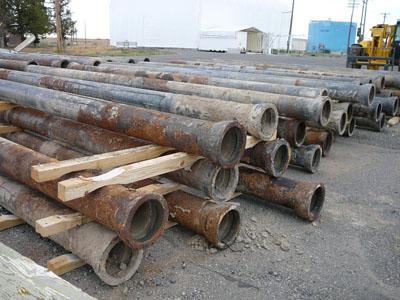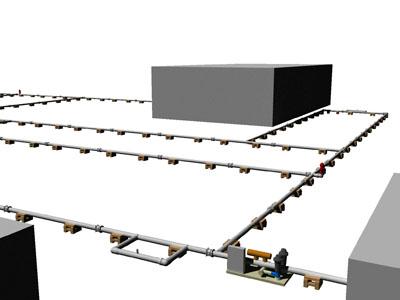Meet EPA Engineer Steve Clark

More Than a Pipe Dream: Building a Pipe Network to Test Decontamination
Steve Clark is an environmental engineer in EPA’s National Homeland Security Research Center (NHSRC). His research focuses on water security, exploring ways to protect and decontaminate pipes and other water “infrastructure.” His work experience began in the Water Program of the Maryland Environmental Health Administration. He then spent a few years as the chief of utilities for US Army at Fort Meade, MD before joining the EPA Office of Ground Water and Drinking Water to do technical analyses supporting the national drinking water standards. After September 11, 2001, he was reassigned to the Water Security Divison and then came to NHSRC in 2004.
How does your science matter?
It’s important for us to know what to do if our water becomes contaminated. If the material clings to the insides of the pipes, how would we clean that up?
I work in the water infrastructure protection division where my colleagues and I are working to answer that question. Right now, I’m developing a water security test bed with partners from the Department of Energy’s Idaho National Laboratory.
We’re building an above ground network using old corroded pipe that has been in the ground for about 30 years. It is cast iron pipe, the type used in an average municipal community in the US. We’re digging up 1500 feet or so, and laying it out like a little grid on a parking lot. We’re going to do contamination and decontamination experiments when it’s built.
We’re using 30 year old pipe because on the inside it is typically very corroded. You know how iron looks after it’s been corroded a long time, around the sea shore? It’s all crusty. It also tends to absorb things differently than newer pipe.
Most of the water pipes in the ground in the US are old, and we want to know what would happen if our water supplies became contaminated and how we would clean them up. We’ll be doing experiments with a type of bacillus species, a safe bacterial surrogate for anthrax, to test our decontamination methods.

What do you like most about your research?
I like that my research involves all different kinds of people: scientists who look at exposure, scientists who look at chemistry, microbiology, radiological contamination. We are integrating all of our different knowledge into the design and experimentation. It's interesting to put together all of these ideas to make our research useful.
When did you first know you wanted to be a scientist?
When I was in junior high, my mother worked as a secretary for a psychiatrist. She found out I was interested in science and would send microbiology books home with my mother. Those books fed my interest in science and medicine.
In high school, I volunteered at a hospital and discovered I did not deal well with the sight of blood. So I decided to go into public health as opposed to medicine.
If you could have dinner with any scientist, past or present, who would you choose and what would you ask them?
I would like to speak with Sir Alexander Fleming . He discovered penicillin almost by accident! He was doing research on the staphylococcus bacteria because he was concerned about wound infection. In the early 1900s, if you had a gunshot wound, they would treat it with an antiseptic on the surface. Unfortunately, this would often cause the wound to go deeper, making the infection worse.

He was studying a bacteria and his plate got contaminated by a mold that was secreting something that killed the bacteria, which he eventually named penicillin. He couldn’t figure out a way of producing penicillin commercially but a few other people figured that out a few years later. Penicillin was being mass produced before we invaded the beaches of Normandy so it saved millions of live almost immediately.
Fleming had a knack for observation. I would like to ask him why he kept looking at the plates after they were contaminated; what made him pursue it? He pursued something that most people would have thrown in the trash.
Tell us about your background.
As an undergraduate, I studied biological sciences at UMBC Exit EPA Disclaimer, near Baltimore, MD. Then I worked for five years for the Maryland State Health Department. Afterward, I went to graduate school for environmental health engineering at the John Hopkins School of Public Health, where I received my Masters degree.
If you were not a scientist, what would you be doing?
"If I were not a scientist?" That's kind of funny! I have a great need to understand the natural environment and how things work, so I would do anything that would involve better understanding how things work and how to solve practical problems.
Any advice for students interested in a career in science?
I’d emphasize approaching your work with the scientific method in mind. For example, having a control group in an experiment is extremely important. Without one, you might miss the whole point!
Learn to communicate well, both verbally and in writing. You have to communicate well as a scientist. Your understanding of something doesn’t mean anything until you can communicate it to someone else.
Finally, be observant! Look for things that seem out of the ordinary or unexpected and try to explain them.
